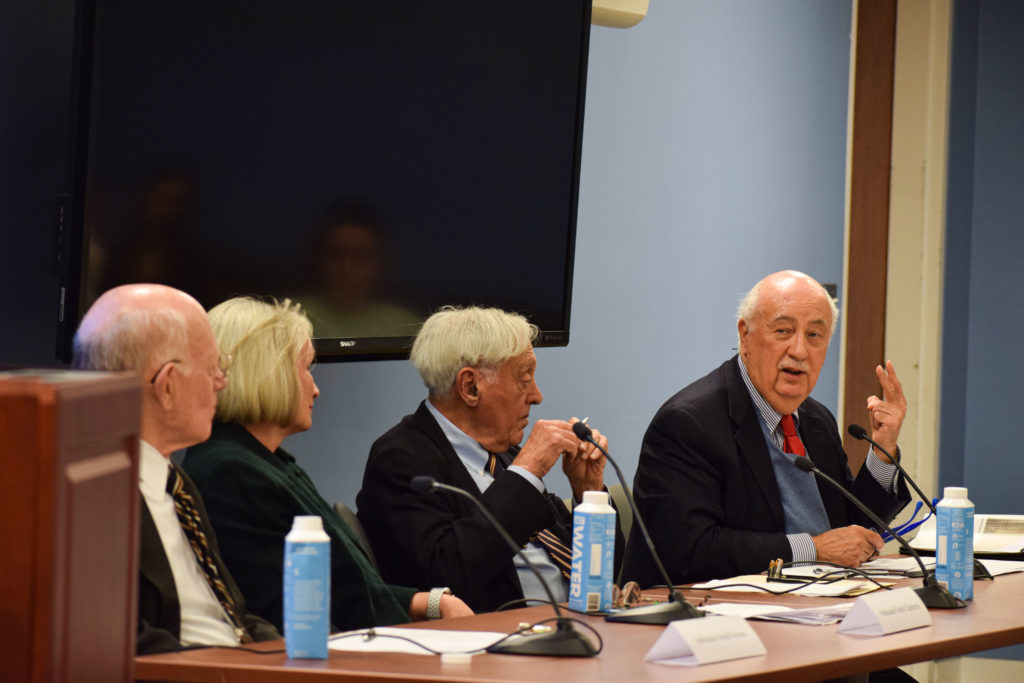A panel of former ambassadors discussed political and moral issues concerning refugees worldwide at the Elliott School of International Affairs Tuesday.
Four former U.S. ambassadors to nations like Afghanistan and Venezuela discussed how nations have responded to international refugee crises at the event. About 50 people attended the event, which was hosted by the American Academy of Diplomacy and No Lost Generation GW, a student organization that promotes “awareness, fundraising and creating education resources for refugees.”
Wendy Chamberlin, a former U.S. ambassador to Laos and Pakistan who served as the deputy and acting United Nations high commissioner for refugees from 2003 to 2006, said the UN’s top refugee agency needs more funding and support from the international community, which has increasingly refused to adhere to UN statutes protecting refugees.
“What has changed so fundamentally in recent years that really affects this issue is the fraying around the edges of some of the UN conventions that have really guided the behavior of states in protecting refugees,” she said.
Chamberlin said climate change has already begun to exacerbate and contribute to refugee crises worldwide. She said refugee crises in Syria and the Darfur region of Sudan are the direct causes of droughts and water scarcity issues sparking civil unrest, which precipitates into full-scale conflict.
“You’re already seeing climate as an instigator of refugees,” she said.
Ronald Neumann, who served as U.S. ambassador to Algeria, Bahrain and Afghanistan at various points between 1997 and 2007 and now serves as the president of the American Academy of Diplomacy, said right-wing opposition to asylum is at odds with international laws granting refugees fleeing persecution the right to seek asylum regardless of how they enter the nation.
“If officers regularly substitute their own judgment for the law, then at the end of the day, there would be no law,” he said.
Frank Loy, a former Under Secretary of State for Global Affairs in the Clinton administration from 1998 to 2001, said he worked on a case early in his career where he had to verify the claims of Vietnamese refugees who said they had aided the United States during the Vietnam War. He said his agency had to make “hard decisions” because of a 1980 U.S. law that limited the number of refugees they could accept.
“We affect people’s lives dramatically,” Loy said.
Loy said the public in countries accepting refugees often shifts its opinion toward refugees once their numbers grow in the receiving nation – whether the impact of the refugees is positive or negative. He said this shift in opinion contributed to the United Kingdom’s decision to leave the European Union and the rise of the far-right German political party Alternative for Germany.
“The reason numbers matter is because people think they will change life in the receiving country,” he said.
John Maisto, the U.S. ambassador to the Organization of American States from 2003 to 2006, said U.S. demand for drugs traveling through Central America have contributed to gang violence and a refugee crisis in the Northern Triangle region of Latin America, which consists of Guatemala, Honduras and El Salvador. He added that lax gun laws in the United States prompt gang members to purchase guns in the country and traffick them back to Central America, worsening the problem.
He said President Donald Trump’s handling of the refugee crisis – particularly the administration’s threats to withhold remittances from these countries to discourage refugees – was “crazy” because of the potential negative repercussions the policies could have for vulnerable individuals.
“It’s people – always look to people,” Maisto said.





